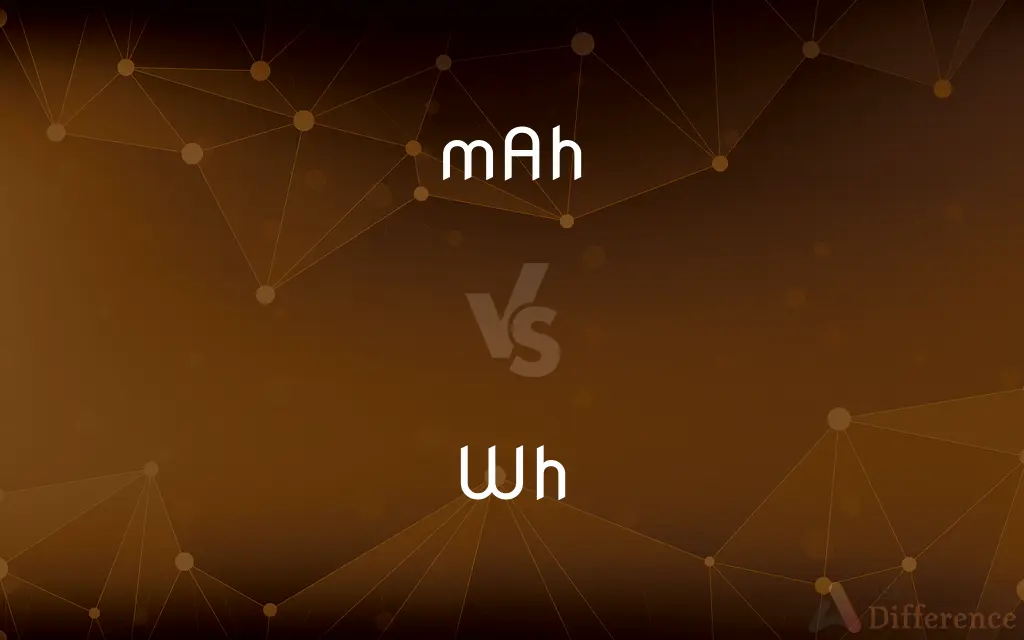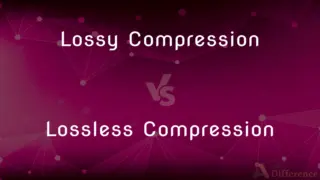mAh vs. Wh — What's the Difference?
By Tayyaba Rehman & Urooj Arif — Published on February 3, 2024
mAh (milliampere-hour) measures electric charge, while Wh (watt-hour) measures energy. mAh reflects battery capacity, while Wh indicates the energy a battery can deliver over time.

Difference Between mAh and Wh
Table of Contents
ADVERTISEMENT
Key Differences
mAh stands for milliampere-hour, quantifying the total amount of energy a battery can deliver in one hour at a consistent rate of discharge. Wh, or watt-hour, represents the battery's energy capacity, correlating to the power it can provide over a specific period. While mAh is centered around the electric charge, Wh integrates both the voltage and the time factor, offering a comprehensive view of the battery's potential.
The concept of mAh is widely used in describing the capacity of smaller batteries, like those in smartphones, emphasizing the duration a battery can last under a nominal load. Conversely, Wh is a broader measure, often applied to larger systems or devices, encapsulating the total energy output without being confined to a fixed voltage, thus providing a more universal comparison of battery capacities across different technologies.
To calculate Wh from mAh, one must consider the voltage of the battery, highlighting the interconnectedness of these units. While mAh alone might indicate a battery's longevity, it doesn't account for the device's power demands. Wh, on the other hand, incorporates both the voltage and the time, painting a fuller picture of the battery's capability to power a device.
In practical terms, a higher mAh value suggests a longer battery life for a device, assuming a constant power draw. However, Wh extends this understanding by illustrating how much work the battery can actually perform, which is vital in assessing batteries for more power-intensive or longer-duration applications.
Understanding the distinction between mAh and Wh is crucial for consumers. mAh offers a quick snapshot of battery capacity, particularly useful for low-power, portable devices. In contrast, Wh provides a more detailed and comprehensive understanding of a battery's energy content, crucial for higher-powered devices and when considering energy efficiency and operational duration.
ADVERTISEMENT
Comparison Chart
Definition
Measures electric charge.
Measures energy.
Usage
Common in small batteries (e.g., smartphones).
Preferred for larger systems (e.g., electric vehicles).
Calculation
Dependent on discharge rate.
Includes voltage and time.
Representation
Battery capacity.
Energy the battery can deliver over time.
Context of Application
Duration battery can last under nominal load.
Amount of work battery can perform (power over time).
Compare with Definitions
mAh
MAh is a standard measure for battery capacity in portable devices.
The new battery's 5000 mAh capacity is impressive for its size.
Wh
Wh measures the amount of energy a battery can deliver.
A battery with a capacity of 50 Wh can supply 50 watts for one hour.
mAh
MAh quantifies how much power a battery can supply over time.
Devices with higher energy requirements need batteries with more mAh.
Wh
Wh is a unit of energy.
This battery pack's total energy content is 500 Wh, suitable for long trips.
mAh
MAh is a unit of electric charge.
Most smartphone batteries range from 2000 to 4000 mAh.
Wh
Wh represents the energy storage capacity of a battery.
The electric scooter has a battery capacity of 300 Wh.
mAh
MAh indicates the storage capacity of a battery.
A battery rated at 2000 mAh can deliver 2000 milliamps for one hour.
Wh
Wh signifies the work a battery can do over a certain period.
A higher Wh rating means more energy for your laptop to run longer.
mAh
MAh represents the charge a battery can hold.
The higher the mAh, the longer your phone should theoretically last between charges.
Wh
Wh quantifies the total energy output of a battery.
The new model has an improved battery with 100 Wh, offering extended usage.
Common Curiosities
How do mAh and Wh differ in battery measurement?
mAh measures electric charge, while Wh measures the total energy output considering both power and time.
What is mAh?
mAh stands for milliampere-hour and measures the electric charge of a battery.
Why is Wh a better measure for high-capacity batteries?
Wh provides a more comprehensive view of a battery's energy capacity, crucial for devices with higher power demands.
Is a higher mAh always better?
A higher mAh suggests a longer battery life, but actual performance also depends on the device's power usage.
Does Wh consider battery voltage?
Yes, Wh accounts for both the voltage and the duration a battery can deliver power.
How does mAh affect device usage?
Devices with batteries of higher mAh ratings typically last longer on a single charge, assuming similar power consumption.
What does Wh represent?
Wh stands for watt-hour and represents the energy a battery can deliver over time.
Can you convert mAh to Wh?
Yes, by multiplying mAh by the battery voltage (in volts) and dividing by 1000.
Are mAh and Wh interchangeable?
No, they represent different aspects of a battery's capacity and are not directly interchangeable.
What does a higher Wh indicate?
A higher Wh indicates a greater energy capacity, meaning the battery can power devices for a longer time or supply more power.
Why is Wh important for electric vehicles?
Wh is crucial for electric vehicles as it indicates the vehicle's range and performance capabilities.
What role does voltage play in converting mAh to Wh?
Voltage is essential in the conversion, indicating the potential difference that drives the electric charge.
Can two batteries with the same mAh have different Wh?
Yes, if they have different voltages, as Wh also depends on the voltage.
How does Wh relate to a device's operational time?
Wh directly relates to how long a device can operate, considering both the battery's capacity and the device's power consumption.
Is it better to compare batteries using mAh or Wh?
It depends on the context; mAh is useful for small devices, while Wh is better for understanding the overall energy capacity, especially for larger or more power-intensive devices.
Share Your Discovery

Previous Comparison
DLP Projector vs. LCD Projector
Next Comparison
Lossy Compression vs. Lossless CompressionAuthor Spotlight
Written by
Tayyaba RehmanTayyaba Rehman is a distinguished writer, currently serving as a primary contributor to askdifference.com. As a researcher in semantics and etymology, Tayyaba's passion for the complexity of languages and their distinctions has found a perfect home on the platform. Tayyaba delves into the intricacies of language, distinguishing between commonly confused words and phrases, thereby providing clarity for readers worldwide.
Co-written by
Urooj ArifUrooj is a skilled content writer at Ask Difference, known for her exceptional ability to simplify complex topics into engaging and informative content. With a passion for research and a flair for clear, concise writing, she consistently delivers articles that resonate with our diverse audience.
















































